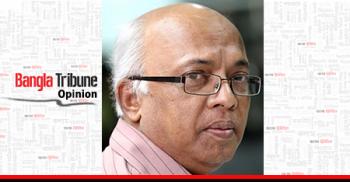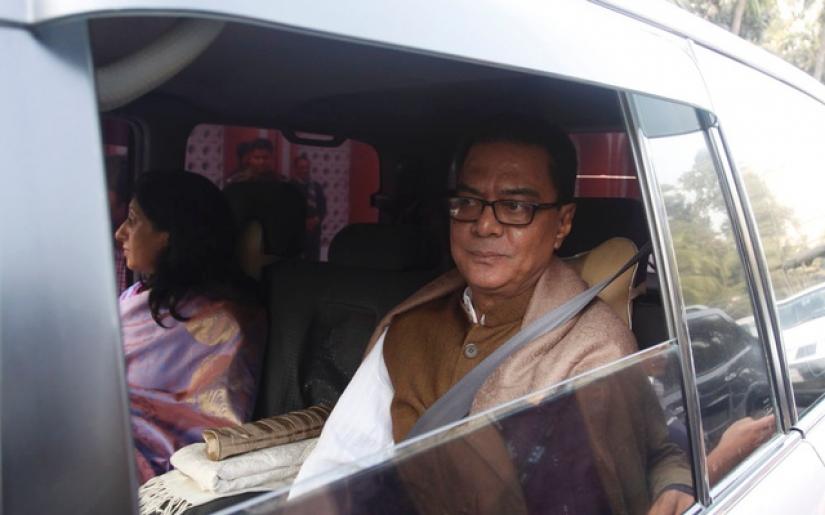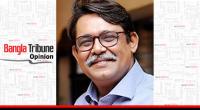 The passing of Syed Ashraful Islam takes from us a politician whose sense of dignity was as acutely pronounced as his understanding of politics. He was part of our generation and yet in his deportment there was every hint of the old-fashioned, in the way he pursued politics. In him throbbed that dedication to values which came of a respect for the other person’s point of view. He was never one to cave in to others or to other brands of politics. Not in him was the politician willing to follow those who stood ready to be led. His concept of leadership was simple and yet traditional. He was willing to listen to the man on the other side of the table, but in the depths of his soul it was his own convictions which mattered.
The passing of Syed Ashraful Islam takes from us a politician whose sense of dignity was as acutely pronounced as his understanding of politics. He was part of our generation and yet in his deportment there was every hint of the old-fashioned, in the way he pursued politics. In him throbbed that dedication to values which came of a respect for the other person’s point of view. He was never one to cave in to others or to other brands of politics. Not in him was the politician willing to follow those who stood ready to be led. His concept of leadership was simple and yet traditional. He was willing to listen to the man on the other side of the table, but in the depths of his soul it was his own convictions which mattered.
Syed Ashraful Islam was made in the mould of his father, the illustrious Syed Nazrul Islam. Both men spoke in the softness that came of sophistication, but neither would give space to others to look upon their politics in cavalier fashion. If in the 1970s it was inner strength which sustained Syed Nazrul Islam on the fields of war, in the 1990s and 2000s it was similar energy which rejuvenated the spirit in his son. For Syed Ashraf, politics was always a matter of saying ‘No’ to compromise. In Britain when news came to him of the murder of the four national leaders, he grieved in silence without giving himself away in public. As a being who had already had a taste of politics, as part of the Chhatra League, he knew better than to take things with equanimity, indeed to take them lying down. That was a rekindling of the old resolve which had propelled him into participation in the War of Liberation. His father was the nation’s acting President. But that reality did not touch him. Like thousands of other young Bengalis, he was happy to be part of the struggle. That was what mattered.
Syed Ashraful Islam’s initiation into politics proper came with his election to parliament in 1996. It was a season when the darkness which had foisted itself on the country was beginning to lift. The children of the 1971 political leadership, the young people from whom their fathers had been snatched through murder-laced conspiracy, were beginning to make themselves heard. The sons and daughters of Bangabandhu and Syed Nazrul Islam and Tajuddin Ahmad and M. Mansoor Ali and A.H.M. Quamruzzaman were coming, or had come of age. In that new spring born out of a spirited resistance to medieval darkness, Syed Ashraf spotted possibilities of a glorious summer. A restoration of values, a requirement of justice and an overturning of dictatorial government were the songs which men like Syed Ashraf sang. His efforts on foreign soil, his arguments in defence of rule of law and his mighty struggle, all in the company of other patriots, paid off in June 1996. Ashraf was back in politics, albeit this time at the national level as a new member of parliament. The future beckoned. The future was to come somewhat later, but in the interregnum between new darkness and the democratic triumph of a nation, between October 2006 and December 2008, Syed Ashraf did not cringe before the new rulers. There was little, if at all any, indication that he was willing to turn on his leader Sheikh Hasina. While others plotted reforms within the political parties, he resolved to keep the Awami League in one vibrant piece as its acting general secretary. Military rule or civilian administration propped up by soldiers is a reality only the most hardened of political beings are able to stand up to. Syed Ashraf defied the threats and spurned the offers that came his way. For him, his party was all. He let his fellow politicians and party activists know that capitulation was the easiest of options and the smoothest road to political perdition. They understood him and stood by him.
The future was to come somewhat later, but in the interregnum between new darkness and the democratic triumph of a nation, between October 2006 and December 2008, Syed Ashraf did not cringe before the new rulers. There was little, if at all any, indication that he was willing to turn on his leader Sheikh Hasina. While others plotted reforms within the political parties, he resolved to keep the Awami League in one vibrant piece as its acting general secretary. Military rule or civilian administration propped up by soldiers is a reality only the most hardened of political beings are able to stand up to. Syed Ashraf defied the threats and spurned the offers that came his way. For him, his party was all. He let his fellow politicians and party activists know that capitulation was the easiest of options and the smoothest road to political perdition. They understood him and stood by him.
That he did not kowtow before the fearful symmetry of the state in those dark months would lead to a natural reward. Syed Ashraf would take over as general secretary of his party and then go on to serve as minister for local government and rural development. But, again, the knives were out for him, in his party. Relieved of his ministerial role, sought to take a back seat in politics and quietly walk away into the sunset. It was public clamour, demanding to know why he had been shown the door, which brought him back, this time at the head of a new ministry geared to public administration. The polite man that he was, Syed Ashraf was not willing to disappoint Sheikh Hasina by turning down the new offer. He stood ready to serve, a responsibility he bore to the very end of his life.
There were the wounds Syed Ashraful Islam carried in his soul. Family was what mattered to him, which explains why he was ready, at every opportunity, to join his spouse abroad. Only he knew of the pain that was on its way, to hit him and his family. But the bonds between him and his spouse were all. Did they both know they were suffering from similar maladies, that their present would soon translate into their past? Did they share their fears with each other? Did they take all that coming pain in philosophical stride? Syed Ashraf grieved at the death of his wife. Even as the heart broke in him, he was careful to put on a public face that would not give him away.
And then he died, quietly, almost unobtrusively, in foreign land. Gentleness defined him. Politeness was the strength which constantly added substance to his character. It is this politician of refined manners and unequalled mannerisms we remember today.
Our prayers rise for Syed Ashraful Islam, even as he rises above our blighted star of a planet to find his way to the gleaming stars making music out there in the cosmos.
Syed Badrul Ahsan is Editor-in-Charge, The Asian Age


